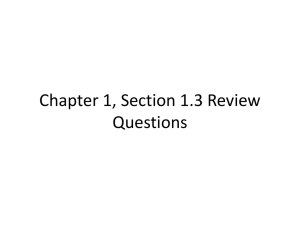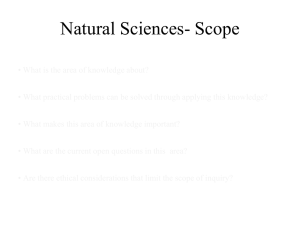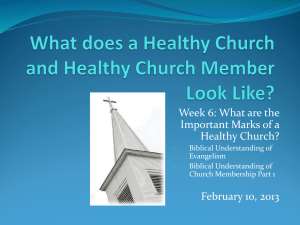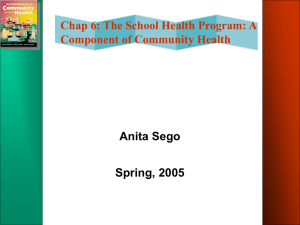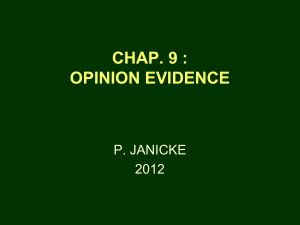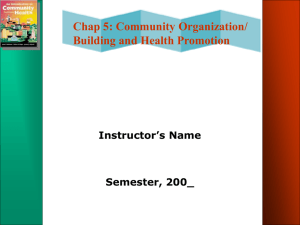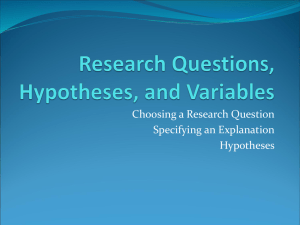Chap 3 Developing Predictive Hypotheses
advertisement
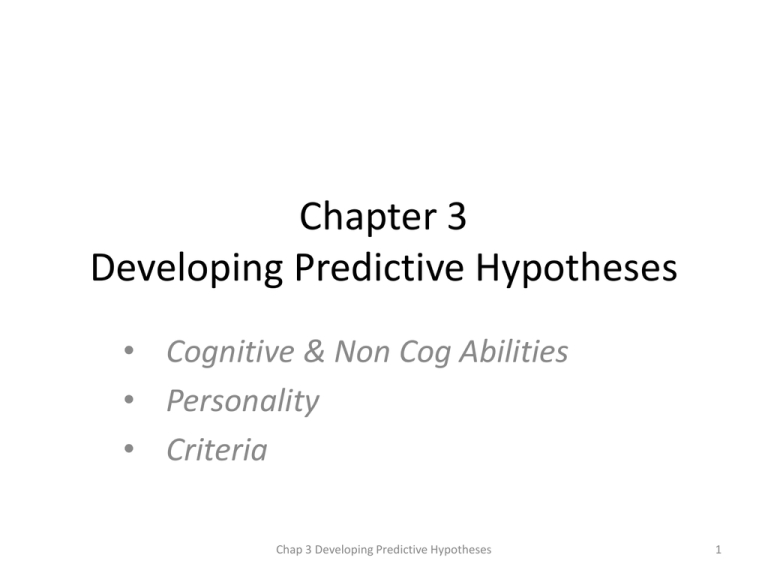
Chapter 3 Developing Predictive Hypotheses • Cognitive & Non Cog Abilities • Personality • Criteria Chap 3 Developing Predictive Hypotheses 1 Conceptual & Operational Definitions Predictors & Criteria • F. Kerlinger’s definitions – Concept or construct: What’s the difference? – Theory v. hypothesis: what’s the difference? • Predictive Hypothesis: – Grounded in theory (explanation relationships) – Predictors & Criteria: defined at two levels: • conceptual & operational: What’s the difference? Chap 3 Developing Predictive Hypotheses 2 • Predictors (KSAOs, other attributes) – (independent vars for experimental research) • Give some examples with operational definitions • Criteria (performance/results) – Outcomes (dependent vars for experimental research) • Give some examples with operational definitions Chap 3 Developing Predictive Hypotheses 3 Theory Building and Testing fig 3.1 p 53 • • • • • 1. Theory: – predictor construct (height) is related to – criterion construct (basketball ability) 2. Predictive hypothesis (testable): – predictor measure (height in inches) is related to – Criterion measure (number dunks in 2 minutes) 3. Predictor measure is valid measure of height 4. Criterion measure is a valid measure of basketball ability 5. Predictor measure is related to the Criterion construct – (confirms prediction and supports theory) Chap 3 Developing Predictive Hypotheses 4 Theory and Practice • Specification of Population – For what populations does the theory hold? • Why would this be important? • Give some examples, – e.g. women in the military? – Geographical differences? • Specification of time intervals – What’s the optimal timeframe for criterion collection? • When and how long should the criterion? – Give examples for jobs with different learning curves Chap 3 Developing Predictive Hypotheses 5 • Specifying functional relationships – Linear • Give examples linear relationships – Curvilinear • Give examples of curvilinear relationships Chap 3 Developing Predictive Hypotheses 6 Criteria • Criterion constructs – Inferring Constructs from Measures – A theory of Performance – Performance Components and Determinants – Contextual Behavior – Trainability Chap 3 Developing Predictive Hypotheses 7 Predictors & Predictive Hypotheses • Avoid “folklore theories” – Use standardized measures proven to work – E.g. Cognitive ability, which is usually superior to non-cognitive measures. • Cognitive Factors (ability to think) • perceive, process, evaluate, compare, create, • Understand, manipulate (ideas), reason – 75 years of Factor Analytic studies Chap 3 Developing Predictive Hypotheses 8 Cognitive • 7 Primary Mental abilities (Thurstone, ‘38) – Verbal comprehension – Word fluency – Spatial ability – Perceptual speed – Numerical facility – Memory – Inductive reasoning Chap 3 Developing Predictive Hypotheses 9 Cognitive Abilities • General Mental Ability (GMA) intelligence – “Processes of • • • • • • Acquiring, Storing (memory) Retrieving Combining, (relationships) Comparing, (relationships) Using in context new concepts (abstraction)” – (Humphreys, ‘79) Chap 3 Developing Predictive Hypotheses 10 GMA • Spearman’s (1927)“g” – Fluid intelligence (Gf) • Basic reasoning – Crystallized intelligence (Gc) • Acquired knowledge (e.g. vocabulary tests) • Carroll (1993) using factor analytic studies – Three stratum model • First order factors (several) • Second order factors (R. B. Cattell’s Gf, Gc) • Third order “g” (like Spearman’s) Chap 3 Developing Predictive Hypotheses 11 Job Specific Ks & Ss • O*Net – three occupational skills list – Basic – Cross functional – Occupation specific • Think of some for the IO psychologist’s job Chap 3 Developing Predictive Hypotheses 12 Personality Constructs • Trait – habitual way of thinking or behaving in response to a variety of situations. – Value, goal, beh tendency to seek or avoid – Sometimes role specific – Called “work styles” “occupational values” (O*Net) Chap 3 Developing Predictive Hypotheses 13 Personality • Five Factor Model (universal) – NEO (CANOE) • Guion & Highhouse – Surgency (extravert, dominance, assertive) – Agreeableness (likeability, friendly) – Conscientiousness (responsible, dependable) – Emotional Stability – Open to experience (intellectance) Chap 3 Developing Predictive Hypotheses 14 Personality • Integrity and conscientiousness – Not engaging in counter-productive behavior • • • • Stealing, embezzlement cheating customers Others? – Trustworthy – Work hard without surveillance Chap 3 Developing Predictive Hypotheses 15 Personality • Other traits (just a few) – Core Self-evaluation (Judge, Eraz, Bono) – Locus of Control (Rotter) • Smith, Trompenaars & Dugan (2007) – PA/NA (positive/ negative affect) • Watson, Clark, Lee Tellegen (1988) – GCOS • General Causality Scale Description (Deci & Ryan) Chap 3 Developing Predictive Hypotheses 16 Personality some questions • • • • Are traits malleable? Are they job specific? How, if so should they be used in selection? What needs to be done to improve their use? Chap 3 Developing Predictive Hypotheses 17 Physical and Sensory Competencies What effect has ADA had? • Physical Characteristics – At what cost are accommodations to the workplace (for ADA?) • Find some examples? – What role does human factors play? • Physical Abilities – Fleishman, Hogan (have studied them) – Are they important in sports? – Are they important in the military? Chap 3 Developing Predictive Hypotheses 18 Non-Cognitive • Emotional Intelligence (Goleman, ‘95) – Perceive, appraise, express emotions • (Mayer & Salovey, ‘97) – Lacks conceptual coherence – Not psychometrically sound – Redundant with other measures? • E.g. cognitive ability, personality traits? – (Matthews, Roberts, & Zeidner, ‘04) Chap 3 Developing Predictive Hypotheses 19 Experience, Education, Training • Credentials are rarely useful – Unless based on a Job Analysis • Some majors may be useful – If knowledge is comparable to professions • Can you think of some? • Can competencies be assessed via testing? – What would Prometric say? Chap 3 Developing Predictive Hypotheses 20 Team Selection Predictors • Technical (often needed) • Stevens & Campion (‘94) Team KSAs • Interpersonal & Self-management • The knowledge, skill, and ability requirements for teamwork: Implications for human resource management (Michael J. Stevens Michael A. Campion, ‘94) • Staffing Work Teams: Development and Validation of a Selection Test for Teamwork Settings (Stevens & Campion, ‘99) • Selection in Teams: An Exploration of the Teamwork Knowledge, Skills, and Ability Test (McClough & Rogelberg, ‘03) • Use of situational judgment tests to predict job performance: A clarification of the literature. (McDaniel, et al. ‘01) Chap 3 Developing Predictive Hypotheses 21
